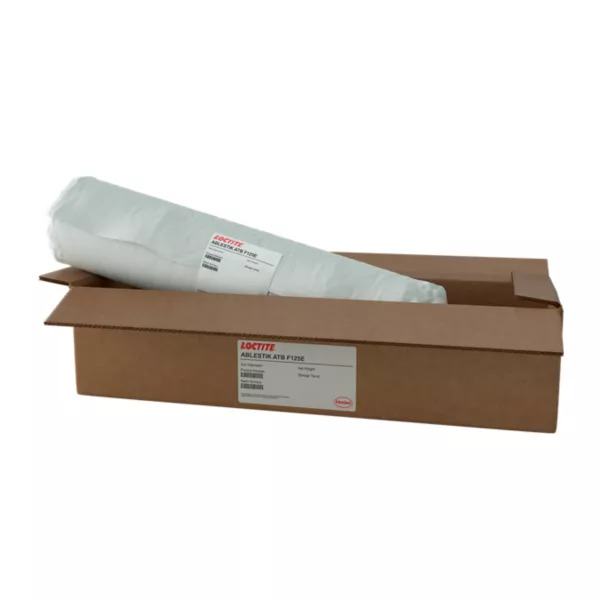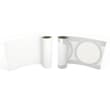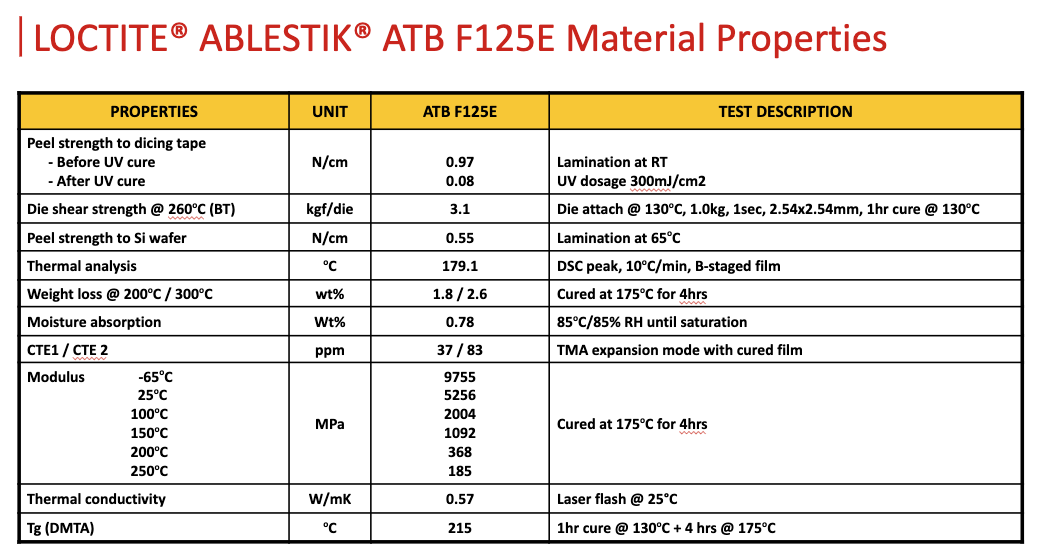LOCTITE ABLESTIK ATB F125E
- 25um
- Non conductive
- Meets thin wafer requirements
Product Description
LOCTITE® ABLESTIK ATB F125E High Modulus non conductive die Attach Film is a 2-in-1 (“precut”) format designed for Small Die applications like DFN, QFN, MLP, SOIC and Sensors moving to thin wafer (<100um). It has a low CTE of 37 ppm, high Tg of 215°C and bulk thermal conductivity of ~0.6 W/mK and is formulated for use in wafer lamination and chip on chip processes or as a preform decal. It is good for thin die pickup and wire penetration and excellent for various filler sizes ranging from 25 to 75um depending on the film thickness. An interesting tidbit is that when you want to reach higher thicknesses, that don't exist in the product portfolio, you can stack 2 layers of a film to get to the desired thickness
LOCTITE® ABLESTIK ATB F125E adhesive film has a thickness of 25um but it is also available in 50 and 75um. The single layer 25um die attach film on special UV dicing tape is suitable for die size range from 0.3x0.3mm to 3x3mm. It performs excellently for die pickup without die fly and re-attach down to 0.3mm die size and for fast die placement (30-100ms) up to 9 months after lamination. Additionally it passes MSL1 up to 2x2mm die.
Cure Schedule
- 1 hour @ 130°C
UV Light
- UV Wavelength, nm (UVA) 365
- UVA Dosage, mJ/cm² 50 to 100
Technical Specifications
| General Properties | |||||||||||
| Adhesive Thickness Adhesive Thickness Adhesive thickness indicates the thickness of an adhesive layer. It refers to the adhesive thickness of a single side so for double sided tapes it always needs to be multiplied. | 25 µm | ||||||||||
| Work life @25°C Work life @25°C Work life is the amount of time we have to work with a material until it is no longer able to be easily worked and applied on a substrate. It is based on the change in viscosity and it can rely on the application requirements. | 2880 hours | ||||||||||
| |||||||||||
| Chemical Properties | |||||||||||
| |||||||||||
| Mechanical Properties | |||||||||||
| |||||||||||
| |||||||||||
| Thermal Properties | |||||||||||
| |||||||||||
| Glass Transition Temperature (Tg) Glass Transition Temperature (Tg) The glass transition temperature for organic adhesives is a temperature region where the polymers change from glassy and brittle to soft and rubbery. Increasing the temperature further continues the softening process as the viscosity drops too. Temperatures between the glass transition temperature and below the decomposition point of the adhesive are the best region for bonding. The glass-transition temperature Tg of a material characterizes the range of temperatures over which this glass transition occurs. | 215 °C | ||||||||||
| Thermal Conductivity Thermal Conductivity Thermal conductivity describes the ability of a material to conduct heat. It is required by power packages in order to dissipate heat and maintain stable electrical performance. Thermal conductivity units are [W/(m K)] in the SI system and [Btu/(hr ft °F)] in the Imperial system. | 0.6 W/m.K | ||||||||||





